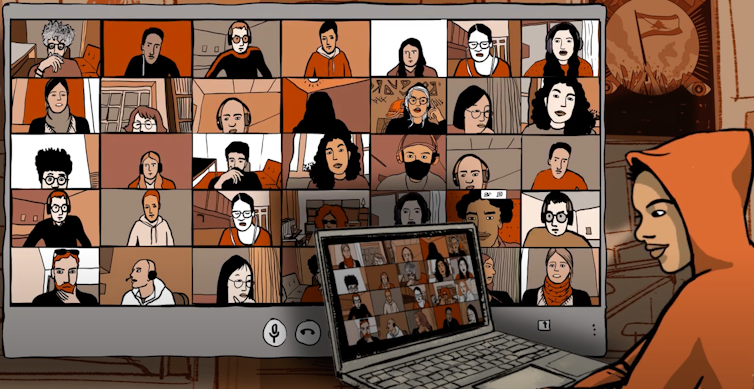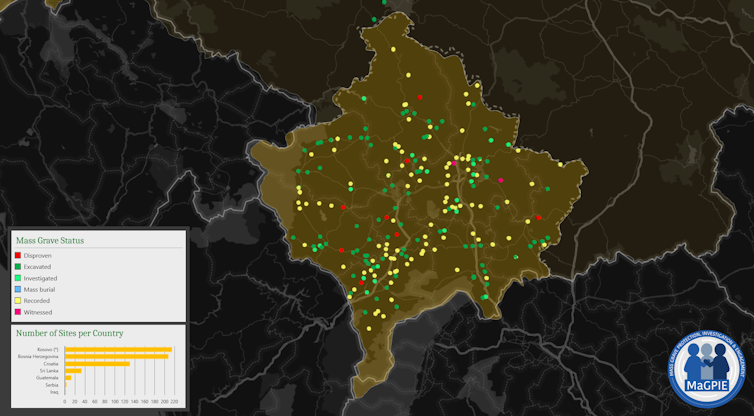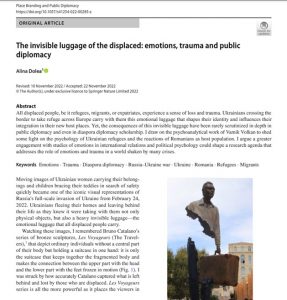In this Insights long-form article for The Conversation, Dr Ellie Smith and Professor Melanie Klinkner write about their work documenting mass graves across the world and the difficulties in locating and investigating such sites…
How the world’s first open-source digital map of mass graves could help bring justice to victims in Ukraine and other war zones
Ellie Smith, Bournemouth University and Melanie Klinkner, Bournemouth University
These newly reported discoveries [of mass graves] confirm our darkest fears. The people of Ukraine and the world deserve to know how exactly those buried in the forest near Izium have died. Amnesty International
Mass graves were reported in Ukraine soon after Russia’s full-scale invasion in early 2022, and were promptly probed by investigators and forensic experts as likely crime scenes.
Soon after the war began, we started to collate information on potential mass grave sites, hoping to get a better understanding of the practicalities of documenting the location of mass graves in real time using open-source information, and to stress test tools that we had developed to support mapping.
It was exacting work: the internet was flooded with reports from many different sources, from potential victims and witnesses to journalists and analysts. The volume of material available to us was enormous, and within it, we needed to work out which reports were reliable, where there might be inaccuracies – innocent or deliberate – and how we should record the location of a verified mass grave.
We were working within an ongoing and rapidly changing situation: in a short space of time, a site would go from being located, reported to the police, formally investigated, excavated and the bodies located in it identified.
Our mapping therefore had to be done at pace to fully verify the open-source reports that we relied on before the situation changed.
The intensity of the work in Ukraine was also a strong reminder to us of the need to protect ourselves and our team from the constant exposure to graphic reports and imagery. As Diego Nunez, a data researcher for the Mass Grave Protection, Investigation and Engagement (MaGPIE) project that we run, told us:
Even if you might be familiar with graphic or explicit content, it is hard not to feel small and powerless in front of the evidence of human rights violations of any kind. From pictures of the mass graves with fresh or skeletonised remains to the testimonies of survivors, each grave seems to tell a story of horror which might be difficult to forget.
It was noticeable how little information was coming out of eastern Ukraine and Russian-controlled regions. For us, this meant an increased risk of an incomplete or skewed map with the potential for it to feed into a political narrative of denial. It was only when Russian troops left certain territories that more information emerged.
But while the inaccessibility or unreliability of information about mass grave sites during an armed conflict presents challenges for us as researchers, it is a source of excruciating anguish for those looking for their loved ones.
That is why we have made it our mission to produce the world’s first global open-source mass graves map. Such a map is important because physical memorialisation of mass grave sites may be difficult where political and ethnic tensions continue to run high or perpetrators remain in positions of power. The digital recording of sites – especially in an open-source format – may serve as a form of memorialisation, providing some form of justice for victims’ families, ensuring that the death of their loved one is recorded and remembered, and helping to counter revisionism and state denial.

This article is part of Conversation Insights.
Our co-editors commission long-form journalism, working with academics from many different backgrounds who are engaged in projects aimed at tackling societal and scientific challenges.
In addition to our ongoing work with the map, we have extensively researched mass grave materials and victim accounts from across the world and have produced a protocol of international standards on how mass grave protection and investigation should be approached.
Millions missing
Mass graves are sites of unimaginable human loss and suffering, and they exist on a shocking scale. According to a report by the UN Special Rapporteur in 2020), “there is not one region in the world, not one historical period, that has not seen mass graves”.
They are present on every inhabited continent and the number of victims they are believed to contain is staggering. In Iraq alone, up to 1 million people are missing and are potentially in mass graves following decades of conflict and human rights violations, from the pre-Saddam Hussein era to the Yazidis killed at the hands of the Islamic State.
In Bosnia and Herzegovina, 7,600 people are still missing following the conflict there. They include over 1,000 victims of the Srebrenica genocide.
And in Cambodia more than 20,000 mass burials at 288 burial sites from the Khmer Rouge era have been found so far, containing the remains of an estimated 1.3 million people.
The ethnographer Adam Rosenblatt has called mass graves, “an underground map of atrocity that stretches across the planet’s surface”.
And for every body hidden in a mass grave, there is a family that is in anguish. The need to know where their loved one is, what happened to them, and to have their remains returned so that they can be mourned with dignity can be overwhelming and enduring.
Crime scene investigation
But mass graves are more than sites of human despair and suffering – they are also crime scenes, containing evidence that is essential for building a case against perpetrators so that families can achieve some element of justice. Despite this, however, until relatively recently there have been no common, international standards to guide practitioners on the best ways to protect and investigate such sites.
We have been able to fill this gap with the Bournemouth Protocol on Mass Grave Protection and Investigation.
We were fortunate enough to be joined by a group of world-leading experts who worked on mass graves in many different capacities, including representatives from the International Commission on Missing Persons (ICMP), the International Committee for the Red Cross and the International Criminal Court. Between them, our collaborators had worked as lawyers, judges, investigators and forensic practitioners in every major mass grave context imaginable, and on every continent.
The protocol follows the chronological stages of mass grave investigation, from the initial discovery of a site to the achievement of justice and commemoration. It is now being used by the ICMP and is available in 15 languages, most recently Ukrainian.
Zahra and Wadad’s quest for answers
To highlight the impact that this trauma can have, we searched for and
compiled the real-life experiences of families of the missing from all over the world for our animated film Resolution.
Our hope for the animation is that any family who finds themselves in the same horrific situation anywhere in the world would be able to recognise their own experiences in it. The six-minute film is told from the perspective of those who are left behind, and focuses on three key characters.
The first two are Zahra and Wadad – they are not real, but their experiences are. They are composite characters, grounded in research that includes published victim narratives and testimony from many different countries that have seen atrocities, including Bosnia, Iraq, Lebanon, Rwanda, Syria and Guatemala. Our research also involved direct engagement with victims’ organisations and expert practitioners with experience of working with the families of the missing.
Our decision to use composite characters for the film was based on our need to ensure the anonymity and safety of survivors, particularly in situations where the perpetrators of atrocities were still in positions of power. It also allowed us to represent the experiences of as many people and contexts as possible.
Zahra’s son was found in a mass grave ten years after he was taken by armed forces from their rural home. Together with hundreds of others who were targeted because of their ethnicity, he was transported to a holding site, tortured and executed.
His body was found in a mass grave that contained the remains of over 200 others. He was identified initially by his distinctive clothing – a hat that Zahra had knitted for him – and later by DNA evidence
Zahra’s search for him had been a long and arduous one. Like many others who were also searching for missing family members, she reported him missing, provided a description and a DNA reference sample. She asked neighbours, survivors and witnesses if they had any idea what had happened to him and where he might be.

YouTube/Lina Ghaibeh and George Khoury
She plastered his image on any available public space – and she waited. And despite the almost daily discovery by international investigators of mass graves in the surrounding area, knowing in her heart of hearts that he must almost certainly be dead, the absence of a body meant that there was always the tiniest shred of hope that somewhere he might be alive and come back to her.
She lived in this agonising state of limbo for more than a decade, unable to mourn her son and to move on with her own life until he had been found. The return of his body to her was devastating, but it also meant that she was able to bury him with the care and dignity that had been denied him in his final days and in his death.
Sadly, Zahra’s experiences are not unique.
Wadad was at home with her husband and two small children, celebrating her husband’s birthday, when the soldiers arrived at their door.

YouTube/Lina Ghaibeh and George Khoury
They beat her husband before taking him away and raped Wadad while her terrified children cowered outside her bedroom door.
Wadad never saw her husband alive again. Like Zahra, Wadad’s quest to find out what had happened to him was a long one. Her children grew into adults as their struggle continued. As political oppression in her country mounted, so did the number of disappearances, and families of the missing swelled the ranks of protesters who were calling for answers.
In the end, the answer did not come from the government but from a survivor who had been imprisoned with Wadad’s husband. He had been executed. Wadad still doesn’t know where his body is.
The experiences of Zahra and Wadad are shared by families all around the world who are searching for their loved ones. The majority of victims in mass graves are men and boys, meaning that many of those who are looking for the bodies of their dead are women. In the immediate aftermath of the Rwandan genocide, for example, 70% of the country’s population was female. In Bosnia, too, the vast majority of the missing are men (86.98%), most of whom were aged between 21 and 60 at the time they disappeared (70.58%).
Like Wadad, women were often victims of human rights violations, including rape and other forms of sexual violence. This means they have to deal with their own trauma and at the same time navigate the ordeal of investigating what happened to their loved one.
In Rwanda alone, between 250,000 and 500,000 women were raped during the genocide. Many of them suffer social isolation and rejection as a result, struggle with ongoing illness including HIV infection, and must try to make a living as a sole breadwinner for their families, including for any children born as a result of rape.
In our film, the body of Zahra’s son is found and returned to her so that she can bury and mourn him. The same cannot be said, however, for Wadad, reflecting the sad truth of mass grave investigation: for most people who are looking for their loved ones, their remains will never be found. Mass grave sites – even when known – will never be excavated, and in other cases remains have been destroyed.
‘They made him disappear completely’
Armando Amaro Cóndor, for example, was a student at Peru’s Universidad Nacional de Educación Enrique Guzmán y Valle who went missing in July 1992.
He was among nine students and one professor who were disappeared and later extrajudicially executed by Peruvian military forces. His sister, Carmen Rosa Amaro-Cóndor summed up her feelings in her evidence to the Inter-American Court of Human Rights when she said:
They made him disappear completely; they burned his body with lime, with gasolene, that shows their complete inhumanity.
Mass grave exhumation is time consuming and expensive, and for countries that lack sufficient resources or expertise, may simply never happen.
In Iraq, for instance, it is estimated, based on the current rate of progress, that to exhume and investigate all currently known mass graves would take 800 years.
But efforts to search for, exhume and identify the dead and prosecute those responsible also requires political will, which is likely to be lacking where those responsible remain in positions of power.
In Guatemala, there is still no specialist public body with a mandate to search for the reported 45,000 people who have been missing since the 36-year conflict ended in 1996. Instead, families have faced official denial and obstruction, aided by an attorney general who remains loyal to former military leaders and political figures directly implicated in the many massacres that took place there. Families must rely instead on civil society organisations to conduct exhumation and identification efforts.
Where the existence of mass graves runs counter to political or nationalistic goals, sites become inconvenient reminders of a truth and a history that leaders are seeking to either rewrite or erase.
For example, nationalism and ethnic tensions are running dangerously high in Bosnia’s Republika Srpska where President Milorad Dodik – a genocide denier – has promised his supporters secession from Bosnia and Herzegovina.
Authorities within the Republika Srpska are actively engaged in revisionism efforts, and since 2016, at the behest of the minister of education and culture, children attending schools in the Republika Srpska have not been taught about the Siege of Sarajevo or the Srebrenica genocide.
Memorialisation has become a highly partisan issue, as murals in the city of Foča have appeared celebrating Ratko Mladić and Milorad Pelemiš, the commander of the 10th Sabotage Detachment of the Bosnian Serb Army – the unit responsible for the killing of over 1,000 Bosniaks at Branjevo Farm in July 1995.
By contrast, of the 42 largest mass graves discovered in the country to date, just 12 of the excavated sites bear any kind of memorial plaque or are otherwise marked. Instead, many have been built over or used as rubbish dumps.
Within this highly tense and partisan context, witnesses to crimes are fearful of reporting mass grave locations. Amor Mašović, chairman of the board of directors of the Missing Persons Institute in Bosnia, said that information about hidden graves is still being stored in people’s heads, but witnesses who were involved in crimes aren’t willing to share their knowledge, partly because of the political climate, adding:
Messages from political leaders go against that, saying those who offer information will become traitors to their people, while those who should be criminally prosecuted for taking people away and forcibly making them disappear are heroes to these politicians.
Wissam is the third character in our film (they are gender-neutral so that the widest possible spread of survivors can recognise themselves in the film).
They are a student in a city in sub-Saharan Africa, where they blog about the political situation. Wissam is chatting with their partner online when they witness armed men break into their partner’s flat and begin to beat him, before dragging him away, out of sight of the screen.

YouTube/Lina Ghaibeh and George Khoury
Wissam uses their online presence to raise awareness of the disappearance, launching a campaign that attracts others from their own country and beyond. There are riots as protests against government oppression grow, but Wissam never learns their partner’s fate or whereabouts. They remain in limbo.
For those who continue to search – and for whom there will never be a body or a trial – we need to find other ways to alleviate their anguish, to restore dignity in death and to bring families some peace, and perhaps some form of justice.
Digital mapping and concealed evidence
Online documentation and mapping is used in other human rights contexts as a way of recording fact, preserving evidence and raising awareness of human rights violations. It is an area that we have been exploring in our work to see how it might be applied to mass graves.
The digital recording and mapping of mass grave sites could also provide protection of the site and preserve its location in the event that the political situation changes and investigation becomes a possibility at some point in the future.
In Guatemala, for example, after decades of impunity and an absence of any will on the part of the state to search for and identify the missing, a new president has been elected on an anti-corruption platform, and the country is currently pursuing the criminal prosecution of a former army general, Lucas Garcia, who held office during one of the most violent and bloodiest periods of the conflict.
It offers families a glimmer of hope that justice will finally be done and loved ones found – but time is running out. Garcia is 91 and his co-accused, Callejas y Callejas, has been declared unfit for trial. Witnesses and perpetrators are dying and memories are fading, along with hopes of locating mass graves and their victims.
But the issue of open-source mapping of mass graves is not a straightforward one.
Mass grave sites are vulnerable to disturbance because perpetrators will often try to cover up their crimes. So publicly revealing the location of a site may actually alert them to the fact that their cover ups have failed. The destruction of or interference with mass graves can then result in the loss or contamination of evidence.
It can also result in damage to the bodies that are buried there, including the separation and commingling of body parts. For those hoping for the identification and return of a family member, this can be both traumatic and catastrophic.
As the conflict in Bosnia was in its final throws, for example, several months after the Srebrenica genocide took place, the US secretary of state issued a statement indicating that US forces had identified the location of a number of mass graves from satellite imagery.
As Bosnian-Serb forces sensed defeat, a concerted and organised effort was made to conceal the evidence of mass graves: they were dug up using heavy machinery and bodies were moved in their hundreds to secondary, smaller sites. The process was brutal and indiscriminate. It meant that body parts became separated and mixed with others, with remains of single individuals being found in multiple different grave pits.
Public disclosure of the location of a mass grave site could also put witnesses and victims’ families at risk of harm, especially where the possibility of criminal investigation exists within a country or those responsible still hold positions of power.
The first global map
While there is currently no system of global record keeping, mapping or monitoring of the number and location of mass graves or of the numbers of victims believed to be in them, there are a few mass grave mapping projects that have been conducted at a country level, including in both Bosnia and Cambodia, providing us with an insight into some of the challenges involved.
Our initial aim was to produce guidance – a number of practical tools – that would enable anyone involved in mapping mass graves to make decisions that were ethical and safe – including when open-source publication should be avoided and how risks could be mitigated.
And our team of specialist researchers has now begun the long process of producing the first world-wide open-source map of mass graves, a process that we envisage will take another 2.5 years to complete.
We continue to encounter many challenges along the way, including how we verify the credibility of online reports and sources, as well as the availability and accessibility of reports themselves.
Cross-referencing materials to validate our sources is hugely time consuming – we are trying to compare the non-comparable. Where sites are unmarked or are situated in remote areas they are harder to identify, bringing with it the risk of under-representation in areas and the possibility that fewer recordings of graves might feed into a revisionist narrative, or deny families the justice and closure they are looking for.
The work is methodical and long. Nonetheless, as a snapshot of our current progress hopefully shows, we are working to ensure that overlooked and under-reported mass graves are captured.

MaGPIE
The image above shows the different types of mass graves recorded in Kosovo. The barchart outlines the large numbers of sites recorded by the project so far.
What next?
The way that we search for, exhume and investigate mass graves has come a long way since the formation of forensic teams in south and Latin America in the wake of the military junta regimes of the 1970s and early 1980s. Since then a number of forensic teams have been founded in Guatemala, Peru and elsewhere to facilitate the exhumation and identification of the disappeared.
The international tribunals that were set up by the UN Security Council after the conflicts in Rwanda and the former Yugoslavia went a step further, introducing multidisciplinary teams that operated on a large scale. The search for the missing has benefited from the application of technology such as satellite imagery and ground penetrating radar, while the development of DNA evidence has been instrumental in the reliable identification of victims.
These developments all inform today’s efforts to find answers for victims’ families in what feels like an increasingly volatile world.
And despite the ubiquity of mass graves across the globe and their significance for families and societies that are seeking to come to terms with their violent pasts, the full scale and nature of the mass grave phenomena is still not well understood. While many countries may legislate to search for the missing, punish those responsible and provide families with the answers they so desperately need, the extent to which those legal commitments are manifested in practice is variable.
Sometimes states may simply lack the capacity and expertise required to conduct credible forensic exhumations that have the potential to meet the needs of families who are often left without the answers they need while perpetrators go unpunished. In order to rectify this, we need a fuller understanding of how legal commitments are being interpreted and applied in practice.
In the meantime, for the families of the missing, the need to find their loved ones and to understand what happened to them does not fade with time, and neither does their commitment to pursue the truth.
Resolution was written and animated by Lina Ghaibeh and Georges Khoury and is dedicated to all those who continue to search. The name is intended to speak, not only to their need for an answer but also to their steadfast resolve – often over decades – to bring their loved ones home. We are grateful to the victims’ organisations that supported us in the development of the film. The survivor quotes used in this article come from materials produced by those organisations, and helped to form its narrative.

For you: more from our Insights series:
- Britain’s ‘broken’ water system: a history of death, denial and diarrhoea
- The overshoot myth: you can’t keep burning fossil fuels and expect scientists of the future to get us back to 1.5°C
- We found over 300 million young people had experienced online sexual abuse and exploitation over the course of our meta-study
- Novelist J.G. Ballard was experimenting with computer-generated poetry 50 years before ChatGPT was invented
To hear about new Insights articles, join the hundreds of thousands of people who value The Conversation’s evidence-based news. Subscribe to our newsletter.![]()
Ellie Smith, Senior Research Fellow, Faculty of Law, Bournemouth University and Melanie Klinkner, Professor in International Law, Bournemouth University
This article is republished from The Conversation under a Creative Commons license. Read the original article.













 SPROUT: From Sustainable Research to Sustainable Research Lives
SPROUT: From Sustainable Research to Sustainable Research Lives BRIAN upgrade and new look
BRIAN upgrade and new look Seeing the fruits of your labour in Bangladesh
Seeing the fruits of your labour in Bangladesh Exploring Embodied Research: Body Map Storytelling Workshop & Research Seminar
Exploring Embodied Research: Body Map Storytelling Workshop & Research Seminar Marking a Milestone: The Swash Channel Wreck Book Launch
Marking a Milestone: The Swash Channel Wreck Book Launch ECR Funding Open Call: Research Culture & Community Grant – Application Deadline Friday 12 December
ECR Funding Open Call: Research Culture & Community Grant – Application Deadline Friday 12 December MSCA Postdoctoral Fellowships 2025 Call
MSCA Postdoctoral Fellowships 2025 Call ERC Advanced Grant 2025 Webinar
ERC Advanced Grant 2025 Webinar Update on UKRO services
Update on UKRO services European research project exploring use of ‘virtual twins’ to better manage metabolic associated fatty liver disease
European research project exploring use of ‘virtual twins’ to better manage metabolic associated fatty liver disease